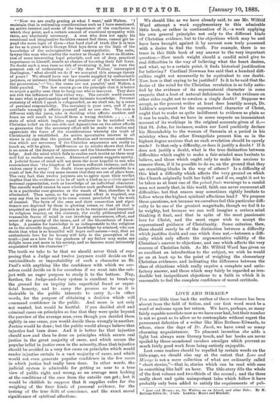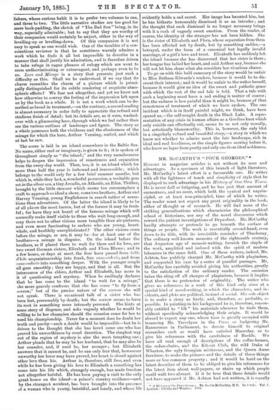LOVE AND MIRA.GE.*
FOR some little time back the author of these volumes has been absent from the field of fiction, and our first word must be a word of welcome upon her return. We have, perhaps, as many fairly capable novelists now as we have ever had, but their number is not so great as to allow us to contemplate without regret the permanent defection of a writer like Miss Betham-Edwards, to whom, since the days of Dr. Jacob, we have owed so many charming acquaintances. To pleasant invention she adds a light but always sure literary touch, and her books are never spoiled by those occasional careless smudges which prevent so much fairly good work from being entirely enjoyable.
Lest some readers should be repelled by certain words on the title-page, we should also say at the outset that Love and Mirage is not a mere collection of what are ordinarily called " short stories,"—that is, stories which can be read with ease in something like half an hoar. The title-story fills the whole of the first volume and two-thirds of the second ; and the three really short and quite unimportant tales which follow it have probably only been added to satisfy the requirements of pub lishers, whose curious habit it is to prefer two volumes to one, and three to two. The little narrative studies are too good for mere book-padding, the sketch of "The Bad Son" being, in its way, especially admirable ; but to say that they are worthy of their companion would certainly be unjust, either in the way of levelling-up or levelling-down. Of this companion it is not easy to speak as one would wish. One of the troubles of a conscientious reviewer is that he sometimes warmly admires a work which he finds it all but impossible to describe in a manner that shall justify his admiration, and is therefore driven to take refuge in vague phrases of eulogy which are wont to seem undiscriminating or extravagant, and perhaps even to be so. Love and Mirage is a story that presents just such a difficulty as this. Shall we be understood if we say that its charm resembles the charm of a picture which is principally distinguished for its subtle rendering of exquisite atmospheric effects P We fear not altogether, and yet we know not how otherwise to convey the feeling of the impression left upon us by the book as a whole. It is not a work which can be described as broad in treatment,—on the contrary, a second reading is almost necessary in order fully to appreciate the refined and studious finish of detail; but its details are, as it were, washedover with a glimmering haze, through which we feel rather than see the various outlines of landscape and figure. The story as a whole possesses both the vividness and the elusiveness of the mirage for which the hero, Arthur Yenning, waited, and which at last he saw.
The scene is laid in an island somewhere in the Baltic Sea. No name, either real or imaginary, is given to it ; it is spoken of throughout simply as " the island ;" and the very namelessness helps to deepen the impression of remoteness and separation from the every-day world. Then, too, it is an island which for more than half the year is icebound and inaccessible ; which belongs to the world only for a few brief summer months, but which is, while they last, a.wonderful possession, a veritable gem set in the silver sea, a tiny Arcadia, an Atlantis, an Eden. Thither, brought by the little steamer which seems too commonplace a craft to approach so ideal a shore, come two brothers, Arthur and Harvey Yenning, young Englishmen in search rather of sensations than adventures. Of the latter the island is likely to be of all places the most barren, but of the former it may be fruitful; for have they not heard of the famous mirage which will assuredly make itself visible to those who wait long enough, and may there not be other visions more tangible than air-pictures, and even more fascinating to seekers who are young, heartwhole, and healthily unsophisticated ? The other visions come before the mirage, or are, it may be—for at least one of the brothers—a mirage in disguise. On the island before the brothers, as if placed there to wait for them and for love, are two sweet German sisters, Elizabeth and Flora Blume ; and in a few hours, or days at most. the four have passed from table d'hote acquaintanceship into frank, free cameraderie, and from camcraderie into something deeper. With the younger couple all goes smoothly ; they are happy, and that is all. But the intercourse of the elders, Arthur and Elizabeth, has more in it of questioning and mystery. When be smilingly declares that he has come to the island "to wait for a mirage," she more gravely confesses that she has come "to fly from a sorrow," but of the precise nature of the sorrow she will not speak. There is occasional talk of a sister who has been lost, presumably by death; but the sorrow seems to have its root in something more intensely personal. She hints at some story of disgrace, and asks vaguely whether he would be willing to be her champion should the occasion come for her to need his championship. Never for a moment does he doubt her truth and purity—such a doubt would be impossible—but he is driven to the thought that she has loved some one who has proved his unworthiness by cruel desertion. The simplest way out of the region of mystery is also the most tempting one ; Arthur pleads that he may be her husband, that he may also be her consoler, and, if need be, her avenger ; but Elizabeth answers that it cannot be, and he can only fear that, howsoever unworthy her lover may have proved, her heart is closed against other love than his. Arthur is, therefore, still free, and even while he has been giving his love to Elizabeth a something has come into his life which, strangely enough, has made freedom not altogether hateful. He has been paying a visit to the only great house on the island—a prince's country residence—and, by the strangest accident, has been brought into the presence of a woman who is young, beautiful, and lonely, and whose life
evidently holds a sad secret. Her image has haunted him, but he has hitherto honourably dismissed it as an intruder ; and the thought that such dismissal is no longer necessary brings with it a rush of vaguely sweet emotion. From the reader, of course, the identity of the stranger has not been hidden. She is the sister of Elizabeth and Flora, whose separation from them has been effected not by death, but by something sadder,—a betrayal, under the form of a canonical but legally invalid marriage, of a girl's love and trust. Elizabeth has suddenly left the island because she has discovered that her sister is there ; her tongue has belied her heart, and said Arthur nay, because she will not let him share what she considers her vicarious shame.
To go on with this bald summary of the story would be unfair to Miss Betham-Edwards's readers, because it would be to discount their interest; and it would be unfair to the writer herself, because it would give no idea of the sweet and pathetic grace with which the rest of the sad tale is told. That a tale with such a beginning must have a sad ending is matter of course ; but the sadness is less painful than it might be, because of that remoteness of treatment of which we have spoken. The one incident which is in itself painful might, we think, have been spared us,—the self-sought death in the Black Lake. A representation of any crisis in human affairs as a Gordian knot which only suicide can effectually cut, seems to us not only morally, but artistically blameworthy. This is, however, the only blot in a singularly refined and beautiful story,—a story in which we know not whether to admire most the fair landscape, rich in ideal and real loveliness, or the simple figures moving before it, who know no lapse from purity and only one from ideal nobleness.







































 Previous page
Previous page